Successful Birding in The “THREATENED KINGDOM” Mabira Forest.
Work work work, our on going research on Avian density through consecutive birding in the Bird-life international IBAs around the L. Victoria basin catchment. Among the top Birding spots in Uganda with the visiting birdwatchers and resident members of Uganda bird-guides club, We have now concertrated in Mabira forest A Threatened Kingdom, which habits a great deal of Congo-guinea forest with a great concentration of Croton, paper mulberry, Cola gigantea, Meopsis eminii, with the help of National Forest authority forest sector manager Christine, Paul and Tony, our head guide plus the forest research assistants Charismatic, hard working Eric Bogere have been birding in Mabira forest area for different entry times of days for several days.
A (a) Among the days in this semi – deciduous forest, keen focus on trees which act as perches, roosting bases for several species, fruit source for frugivores, riverine sectors with water insects, flies, butterflies, caterpillars attracting from the smallest passerine, near passerine and Top of the chain raptors.
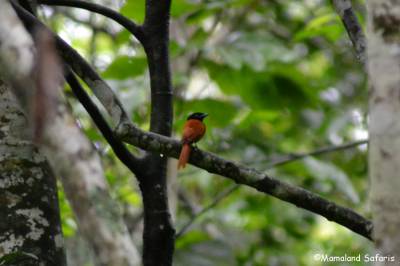
Jameson’s wattle eye in Mabira Forest
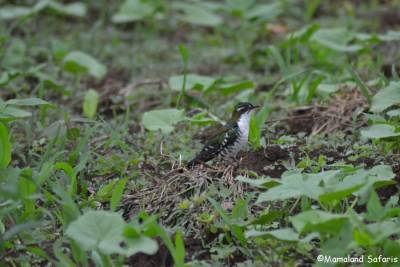
Diedrik cuckoo in Mabira Forest
The common trees that will charm botanists with keen interest in tropical ecology are Cordia Africana, Paper mulberry, Albizhia coriaria, Warburgia ugandensis, Zanthoxylum chalebuem, Ficus ovate, Terminalia superba and several other with most posing to cure over 35 ailments a top place for medicinal tourism.
B (a) Threats to the biggest scavenger of carbon emissions in the Central region Being loggers with chain saws, communities encroachers for settling and farming, charcoal burning activities for energy, thank the patrol men from NFA as we need and call for more efforts to save the Forest from destruction with critical maximum strategies.
With this recent consistence of the forest visit as Birding in Uganda gathers pace, the checklist composition made by these birding guides includes the notoriously difficult birds to see in the area which are a charm when gripped by any birdwatcher!
Our start is boosted by exciting contact calls of the rare forest robin, its hard to see as it flashes from end to end! With the Green Crombec call above us, we despair to tick it as heard! The yellow white eye calls too as its lower pitch gives it away immediately. It’s a great start as the forest is alive! With our Bird Population Programme in Uganda initiated by our top conservation body NatureUganda, as we monitor birds everywhere. Our Monitoring forms are dominated by top birds as we use the BPM programme scheme. As we apply the line transact method.
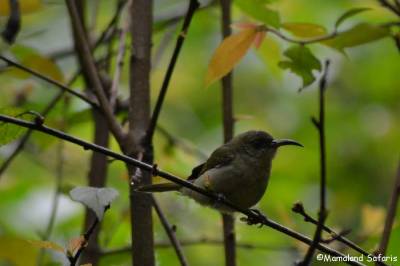
Olive sunbird in Mabira Forest
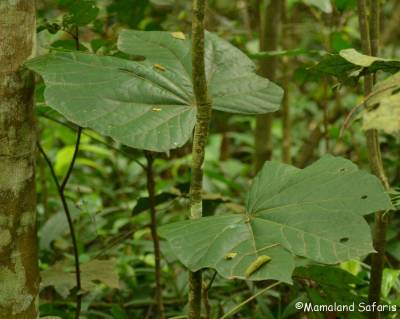
Cola gigantea – a fascinating tree in Mabira Forest
Here is a list in Taxa order bellow with the birds commonly seen while birding in Mabira Forest.
1 Reed cormorant
2 Black headed heron
3 Marabou stork
4 Hadada ibis
5 Yellow-billed kite
6 Black-shouldered Kite
7 Hooded vulture
8 European Honey-Buzzard
9 African Harrier-Hawk
10 Ayres’s Hawk Eagle
11 Long-crested Eagle
12 Crowned eagle
13 Helmeted Guineafowl
14 Crested Guineafowl
15 White-spotted Fluff tail
16 Red eyed dove
17 African Green-pigeon
18 Ring-necked Dove
19 Grey Parrot
20 Great Blue Turaco
21 Eastern Grey Plantain-eater
22 Red-chested Cuckoo
23 Black Cuckoo
24 Diederik Cuckoo
25 Klaas`s Cuckoo
26 African Emerald Cuckoo
27 Little Swift
28 African Palm swift
29 Speckled Mousebird
30 Narina Trogon
31 Striped Kingfisher
32 Blue-breasted Kingfisher
33 African Pygmy kingfisher
34 White-throated Bee-eater
35 Forest Wood-hoopoe
36 Crowned Hornbill
37 African Pied Hornbill
38 Black-and- white- casqued Hornbill
39 Yellow-rumped Tinkerbird
40 Speckled Tinkerbird
41 Hairy-breasted Barbet
42 Yellow-spotted Barbet
43 Double-toothed Barbet
44 Yellow-billed Barbet
45 Least honey guide
46 Buff-spotted Woodpecker
47 Brown-eared woodpecker
48 Yellow-crested Woodpecker
49 Sand Martin
50 Lesser Striped Swallow
51 Angola swallow
52 Black Saw-wing
53 White-headed saw-wing
54 African Pied Wagtail
55 Yellow Wagtail
56 Yellow-throated Longclaw
57 Common bulbul
58 Yellow-whiskered Greenbul.
59 Little Greenbul
60 Slender-billed Greenbul
61 Cameroon Sombre Greenbul
62 Red-tailed Bristlebill
63 Green-tailed bristlebill
64 Red-tailed Greenbul
65 White throated greenbul
66 Honey guide Greenbul.
67 Forest robin
68 Fire-crested Alethe
69 White-browed Robin-Chat.
70 Snowy-headed Robin Chat
71 Red-capped Robin-Chat
72 African Thrush
73 Rufous-fly catcher thrush
74 Whin chat
75 Garden Warbler
76 Willow Warbler
77 Green hylia
78 Green crombec
79 Red faced cisticola
80 Tawny-flanked Prinia
81 Grey-capped warbler
82 Grey-backed Camaroptera.
83 Buff-throated apalis
84 Black-throated apalis
85 Northern black flycatcher
86 Pale flycatcher
87 African dusky flycatcher
88 Lead coloured Fly catcher
89 African Shrike-flycatcher
90 Black-and-white Shrike-flycatcher
91 Brown throated wattle eye
92 Chestnut wattle eye
93 Jameson wattle eye
94 African paradise-flycatcher
95 Red-billed paradise-flycatcher
96 African blue- flycatcher
97 Scaly- breasted illadopsis
98 White shouldered tit
99 Yellow white eye
100 Coppery sunbird
101 Scarlet chested sunbird
102 Olive bellied Sunbird
103 Red chested sunbird
104 Green sunbird
105 Olive sunbird
106 Green throated sunbird
107 Collared sunbird
108 Bocage’s Bush-shrike
109 Velvet mantled Drongo
110 Pied crow.
111 Western black headed oriole
112 Grey headed sparrow
113 Baglafetcht weaver
114 Compact weaver
115 Grosbeak weaver
116 Black necked weaver
117 Black – bellied seed cracker
118 Violets black weaver
119 Black necked weaver
120 Red-headed Malimbe
121 White-breasted Negrofinch
122 Fan tailed widow bird
123 Red head blue bill
124 Fawn breasted waxbill
125 Black-crowned waxbill
126 Village indigo bird
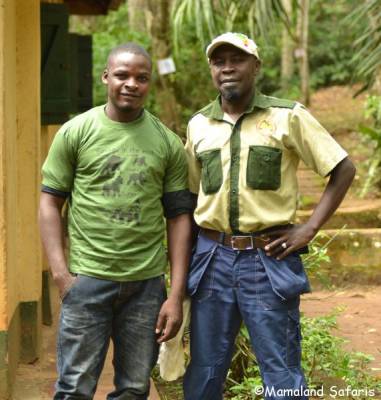
Tony with the local birding guide at Mabira forest


